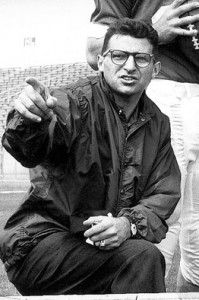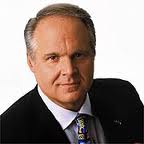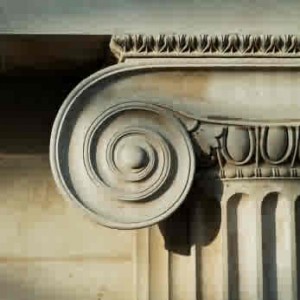by Christopher Perrin, PhD | Nov 11, 2011 | Articles
 Just last week I mentioned Joe Paterno in my blog post responding to Rush Limbaugh’s critique of “classical studies.” I mentioned Joe because he himself was classically-educated. There is a chapter in his autobiography entitled “Joe Knows Latin.” He even patterned his football team off the Spartan army: like the Spartans each players performs for the team, not himself; a touchdown is scored by the team, by the center as much as the quarterback. Note the jerseys and helmets–no names on the jerseys, no stars and stickers on the helmets. The Nittany Lions are Lions indeed, but Spartans too.
Just last week I mentioned Joe Paterno in my blog post responding to Rush Limbaugh’s critique of “classical studies.” I mentioned Joe because he himself was classically-educated. There is a chapter in his autobiography entitled “Joe Knows Latin.” He even patterned his football team off the Spartan army: like the Spartans each players performs for the team, not himself; a touchdown is scored by the team, by the center as much as the quarterback. Note the jerseys and helmets–no names on the jerseys, no stars and stickers on the helmets. The Nittany Lions are Lions indeed, but Spartans too.
Most of us know of the Spartans famous stand at Thermopylae–how 300 Spartans led by king Leonidas held off the huge force of advancing Persians long enough to save the rest of Greek army that was able to retreat. Leonidas and the Spartans were all killed, dying glorious deaths. It appears now that Joe is making his last Spartan stand, though his enemies have not been invaders but but a traitor within the ranks–a traitor he was not willing to bring fully to justice. And so the king of the Spartans at Penn State is falling, but not so gloriously as we had hoped. On the spot where the Spartans died at Thermopylae there was erected a stone lion and an engraved stone that reads, “O stranger, go tell the Spartans that here we lie, having fulfilled their orders.” What do we now make of the stone lion on the campus of Penn State, and what epigraph will we write for Joe?
I must conclude with a personal irony. I live in central Pennsylvania; two of my brothers-in-law are Penn State graduates. I consult with a classical school in State College. But I have never been to a Penn State football game. This Wednesday, however, I was offered a ticket for the first time ever (my father-in-law was given two). Over lunch on Wednesday, we made plans to go see the Nebraska game–my father-in-law will be taking my son Noah to this historic game–his first college football game ever. The Spartans will be there, but not their king.
by Christopher Perrin, PhD | Nov 7, 2011 | Uncategorized
 Many readers of this blog know Ken Myers–a remarkable reader, interviewer and thinker. His audio journal, Mars Hill Audio has been a form of sustenance to thousands of thoughtful Christians in the U.S. He is also an advocate of the renewal of classical, Christian education and speaks frequently at classical schools (just recently he was at the Geneva School of Orlando) and conferences. Last November I had the pleasure of interviewing him at his studio in Virgina.
Many readers of this blog know Ken Myers–a remarkable reader, interviewer and thinker. His audio journal, Mars Hill Audio has been a form of sustenance to thousands of thoughtful Christians in the U.S. He is also an advocate of the renewal of classical, Christian education and speaks frequently at classical schools (just recently he was at the Geneva School of Orlando) and conferences. Last November I had the pleasure of interviewing him at his studio in Virgina.
Ken suffered a significant heart attack two days ago, but apparently has also experienced a miraculous recovery. After an induced coma and three shock treatments, he has emerged eating, joking and laughing with nurses and family. See Matthew Lee Anderson’s blog for an email excerpt from a family member describing Ken’s condition: Mere Orthodoxy: Matthew Lee Anderson
Please pray for Ken’s continued recovery.
by Christopher Perrin, PhD | Nov 1, 2011 | Articles

Today (11/1/2011) on his radio program, Rush Limbaugh responded to a woman with a classical studies degree who was complaining (via a sign at a protest) that she could not get a job. This led Limbaugh to suggest that perhaps she should not have taken a classical studies degree in the first place, wondering aloud why someone at her college didn’t tell her it was a worthless degree. He then debunked the notion (apparently believed by too many college students) that a college degree of any sort guarantees a high-paying job.
Well. As you might guess, I think studying classical literature and language can be an excellent choice–but not necessarily because it automatically (in quid pro quo fashion) results in a high-paying job. In fact, what is lost in the whole debate is the question about what an education is ultimately for. Is it for getting a good job? Is for preparing us to be efficient workers in the American democracy? Is it for enabling us to make a good deal of money? Or is it primarily for shaping and cultivating our humanity? Some have put the question this way: Is education primarily about making a living or learning how to live?
We Americans are quite pragmatic, and I admit that even as a classical educator and publisher I think a good deal about what practically should happen. But the traditional, classical approach to education which has emphasized the cultivation of a human soul, nourished by the study of truth, goodness and beauty (not too American, eh?) has actually produced extremely practical, capable people. We need only cite the likes of Thomas Jefferson, James Madison and John Adams to make our case. These men could not have helped produce the American Republic had they not been steeped in “classical studies” and yes, even Latin. When we read the Federalist Papers we find regular references to the history and governments of Greece and Rome and classical authors cited in Latin, without translation. These men had cultivated souls. They were classically educated. They were eminently practical.
Today a classical education may not result in a quick hire as a web developer, project manager or accountant. But study the people who have had a good classical education. You will find them leading and serving others. By analogy, study those who have studied English. Yes, you will find some of them waiting on tables (along with some business majors), but you will also find that among fortune 500 companies it is not business but English which is the more common major among company CEOs. It just may be the case that studying literature, language and humanity may just be a terrific preparation for creatively and wisely serving and leading…other humans.
Can we cite a few classically-educated humans? Joe Paterno (who patterned the Nittany Lions after Sparta), J.K. Rowling (now I understand Voldemort and all those spells), J.R.R. Tolkien (who created his own language and world) and Ted Turner (who blew out cable TV). The classically-educated serve well, and have for about a thousand years. Perhaps the most famous CEO of all time (Steve Jobs) repeatedly said that he sought to make Apple the intersection of the liberal arts and technology. Anyone who has used an iPhone, iPad or Mac knows that Apple has wed beauty to technology–and made the use of sophisticated technology in some surprising ways, humanizing. If you love your iPhone, in some measure you can thank the liberal arts.
For your reference: Dana Gioia, the former director of the National Endowment of the Arts, wrote and influential essay called “Can Poetry Matter?” as well as “Business and Poetry.” Both essays make a strong case for liberal studies and practical affairs. See www.danagioia.net. See also this article published by USA Today which suggests that an MBA is not always the best route to business leadership–in the opinion of leading CEOs. See Liberal Arts and College.
Download a free copy of An Introduction to Classical Education (by Christopher Perrin) here.
by Christopher Perrin, PhD | Nov 1, 2011 | Articles
What is Classical Education?

Christopher A. Perrin, M.Div, Ph.D.
Most of us have a difficult time defining the word education—it has a wide range of meaning and is used in different ways in different contexts. Certainly education can be formal (as in a college education) or informal (his stern aunt provided him a fresh education in manners).
The word classical is no easier to define. It can refer to a certain kind of music (that came well after the Greeks and Romans) and a certain kind of literature (the “classics” of western civilization). It can refer to a historical period (The Greeks and the Romans) and architecture (style, concepts and motifs from Greece and Rome). Of course it can also refer to Greek and Latin when used in the phrase classical languages.
But classical can also refer to anything that has become standard and authoritative (in a given field) as opposed to novel and experimental. Thus we can speak of classical physics and even classical book-making, bread-making or beer brewing. And of course, classical education.
Given the wide semantic range of both classical and education it is not surprising that the phrase “classical education” is also used with various meanings. Language is flexible, and so we have some varied and flexible uses of “classical education.” This means that there can be several legitimate uses of the phrase—but it would be wise to know just what a given speaker means by classical education. Here are several ways the phrase is used:
- classical education: a study of the Greek and Latin languages (linguistic definition)
- classical education: a study of the Greek and Latin languages and the history, literature, art, philosophy and culture of Greek and Roman civilization (linguistic and cultural definition)
- classical education: a study of the great ideas of western civilization as contained in the classic “great books” produced by that civilization; a study of the “best that has been thought or said.” (intellectual history definition)
- classical education: a study of the seven liberal arts of grammar, logic, rhetoric (the trivium) and arithmetic, geometry, music and astronomy (the quadrivium). (curricular definition)
- classical education: a study of the seven liberal arts employing traditional teaching insights and methods (such as singing, chanting, Socratic discussion and debate) passed down to us by past educators. (pedagogical definition)
- classical education: the cultivation of wisdom and virtue by nourishing the soul on truth, goodness and beauty by means of the seven liberal arts (soul-ish or psychological definition)
- classical education: an approach to education that seeks to create a community of learning, characterized by academic rigor, warmth and delight and involving vibrant interaction of teachers, parents, friends and others. (communal definition)
Now, all these definitions reflect current use. This is because classical education, as a rich, complex 2500 year-old tradition, does contain many important elements (linguistic, cultural, intellectual, curricular, pedagogical, psychological and communal elements). Because classical education is so rich and complex, it is hard to sum it up in one or two sentences. Here is a crack at it—this time including a theological element:
classical (and Christian) education: a traditional approach to education that blends Christian theology with the historic curriculum and pedagogy of the seven liberal arts in order to produce societal leaders characterized by wisdom, virtue and eloquence.
This may be a decent “dictionary definition,” but like so many brief definitions of complex topics, it is so general that it lacks clarity and punch. What after, all is Christian theology, pedagogy and the seven liberal arts? And if we listed the liberal arts, how many of us would like to know more about grammar, logic or rhetoric as an art? How many of us have a clear sense of what virtue and eloquence mean? But alas, when we abbreviate we must leave things out. So where do we go from here? To the same place we go after putting down the dictionary—to an article, encyclopedia, pamphlet or book; another level down.
Going another level down, we would discover that classical education has also traditionally emphasized:
- The training of leaders: those governing and leading culture were educated classically while others were trained for particular jobs and tasks
- Reflection and leisure: time for discussion, thought and application was a necessary part of acquiring wisdom, capacity and skill
- A common curriculum: students all study the essential curriculum of the seven liberal arts which were thought to prepare students for any profession or field of endeavor
- Interaction with tradition: the knowledge, wisdom and art of the past were honored and studied for present use
- Innovation according to need: classical education adapted to new geography, circumstances, discoveries and continued with “theme and variation”
- Partnership with the church: education was informed and guided by church liturgy, teaching, training and financial support
- Training affections and the intellectual virtues: educators sought to shape and form the student and not merely inform him. Students were taught to “love that which is lovely” and acquire the virtues necessary to be eager and excellent seekers of truth.
You can see how easily we could now write an article, pamphlet or book! Each of the items above deserves to be further expanded and explored.
With homeschooling parents talking increasingly about the classical approach to education, it will do everyone good to become familiar with the basic contours or essential elements of traditional, classical education. We should avoid facile, “straw man” constructions of classical education that are easy to dismiss as much as we should avoid glowing and sentimental descriptions that present it as a cure-all. By becoming more familiar with this rich tradition in education, we will better communicate and better make use of its riches.
Resources for further study:
For those beginning a study of classical education and ready for the next another level of exploration, I recommend the following:
An Introduction to Classical Education: A Guide for Parents (45 page pamphlet available in paper back but also available as a free download at Classical Academic Press.com)
Classical Education: The Movement Sweeping America (Gene Edward Veith and Andrew Kern, published by the Capital Research Center)
 Just last week I mentioned Joe Paterno in my blog post responding to Rush Limbaugh’s critique of “classical studies.” I mentioned Joe because he himself was classically-educated. There is a chapter in his autobiography entitled “Joe Knows Latin.” He even patterned his football team off the Spartan army: like the Spartans each players performs for the team, not himself; a touchdown is scored by the team, by the center as much as the quarterback. Note the jerseys and helmets–no names on the jerseys, no stars and stickers on the helmets. The Nittany Lions are Lions indeed, but Spartans too.
Just last week I mentioned Joe Paterno in my blog post responding to Rush Limbaugh’s critique of “classical studies.” I mentioned Joe because he himself was classically-educated. There is a chapter in his autobiography entitled “Joe Knows Latin.” He even patterned his football team off the Spartan army: like the Spartans each players performs for the team, not himself; a touchdown is scored by the team, by the center as much as the quarterback. Note the jerseys and helmets–no names on the jerseys, no stars and stickers on the helmets. The Nittany Lions are Lions indeed, but Spartans too.









